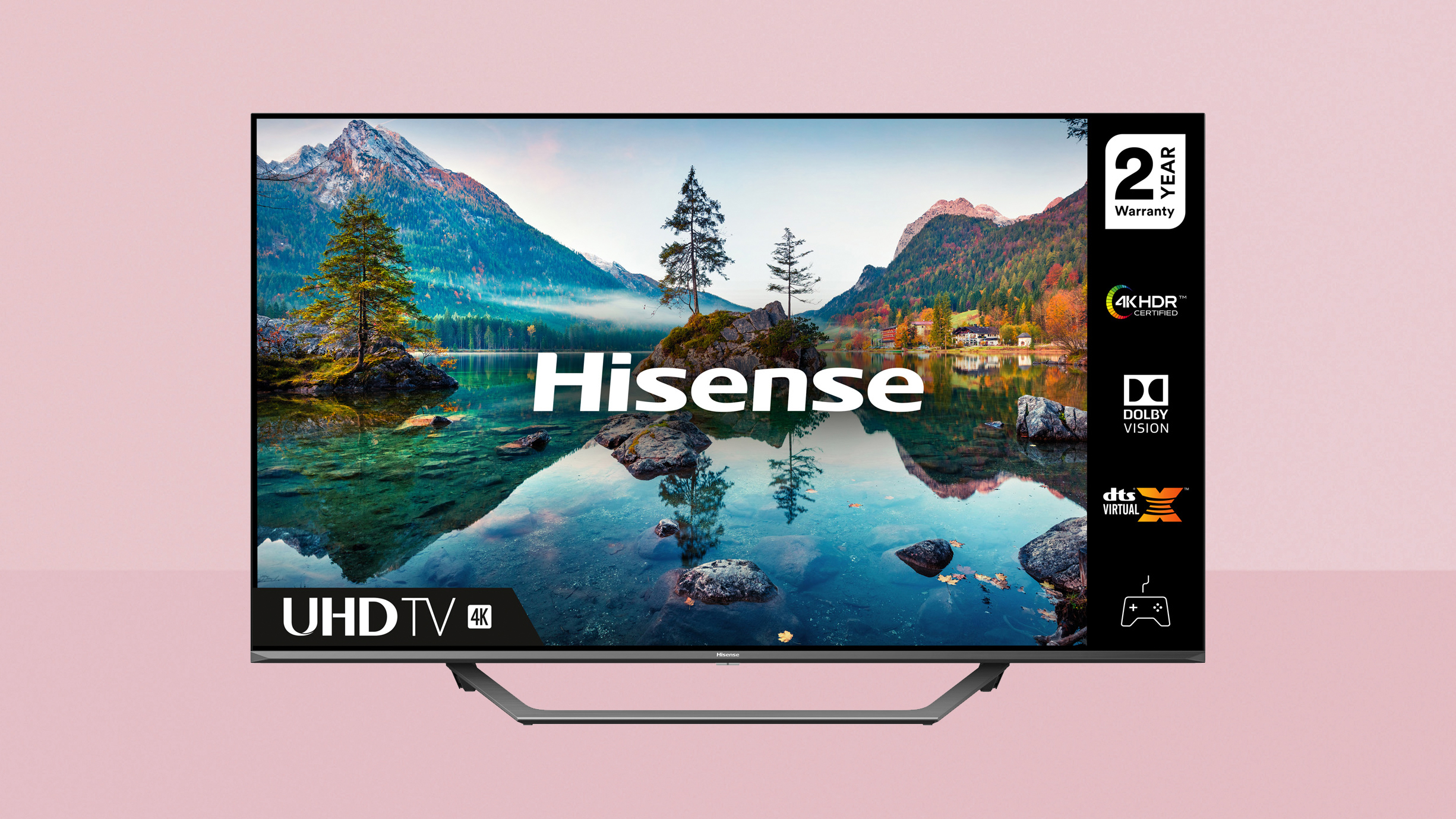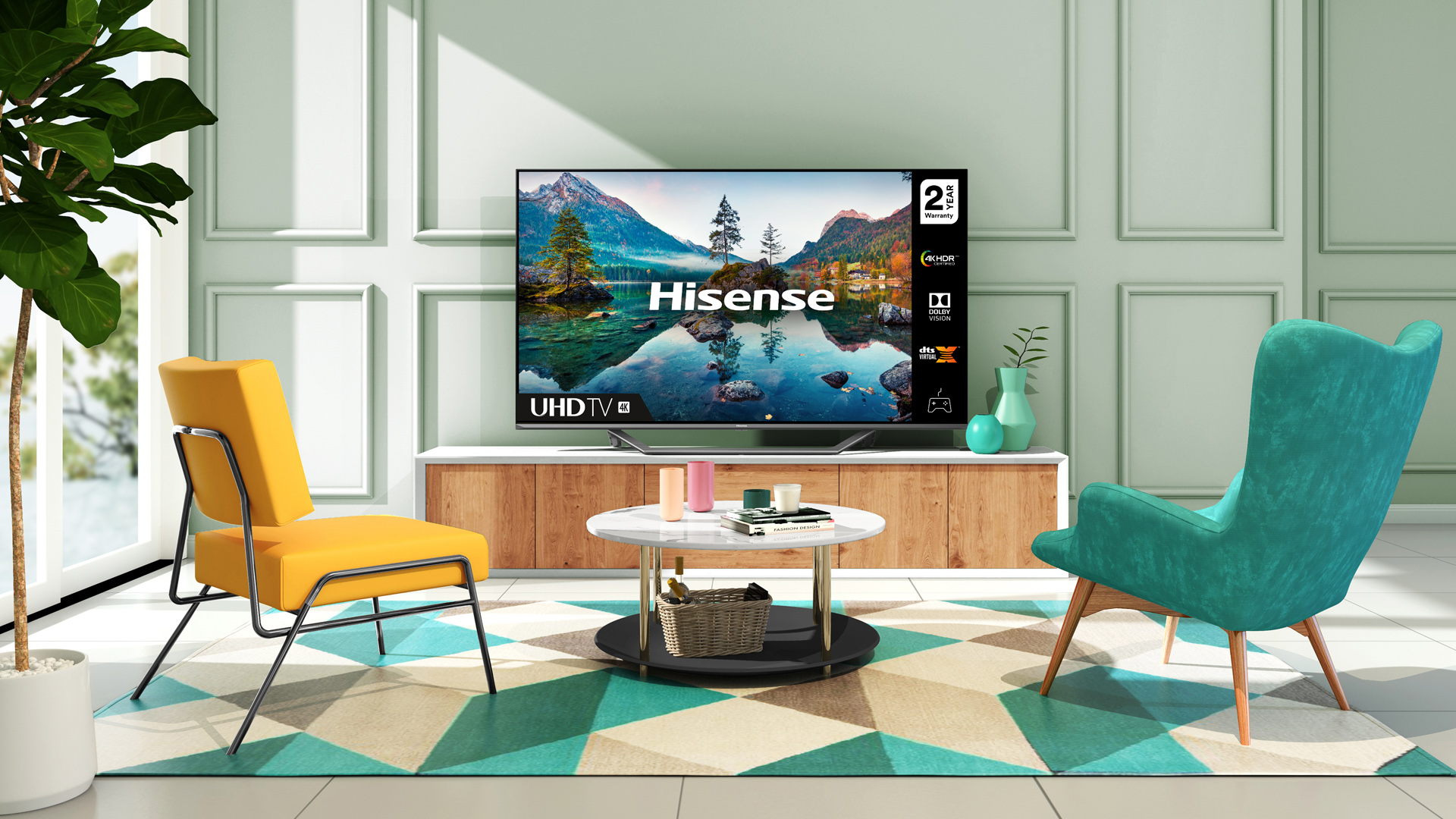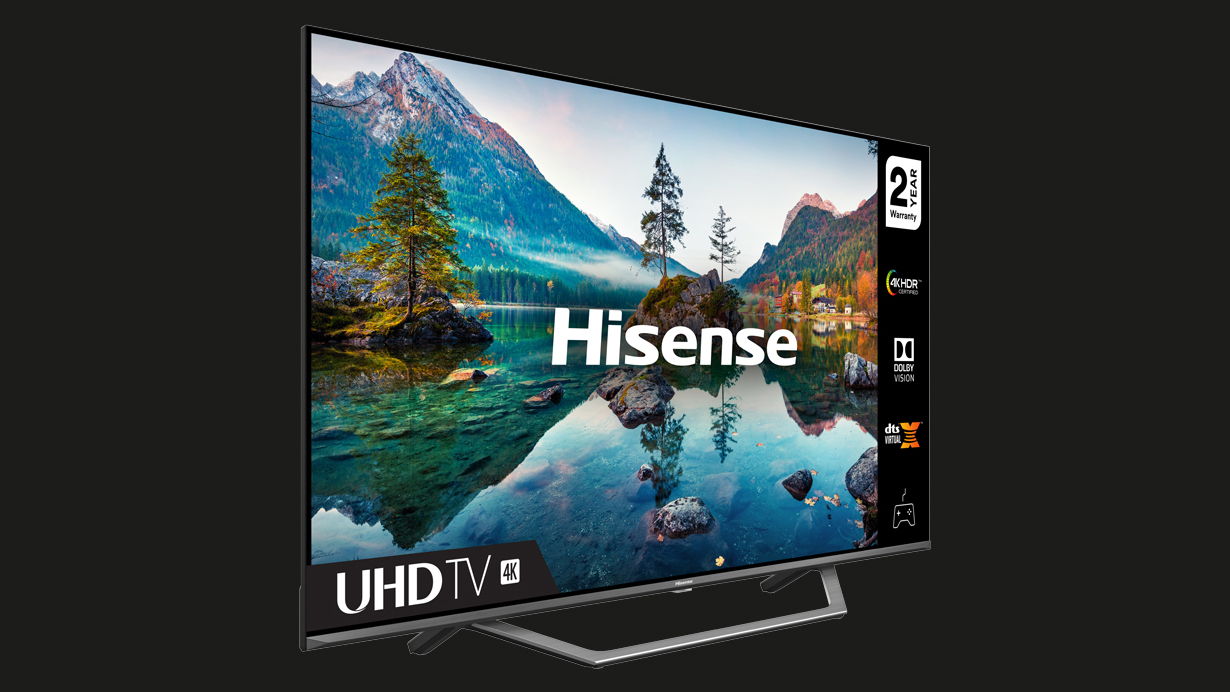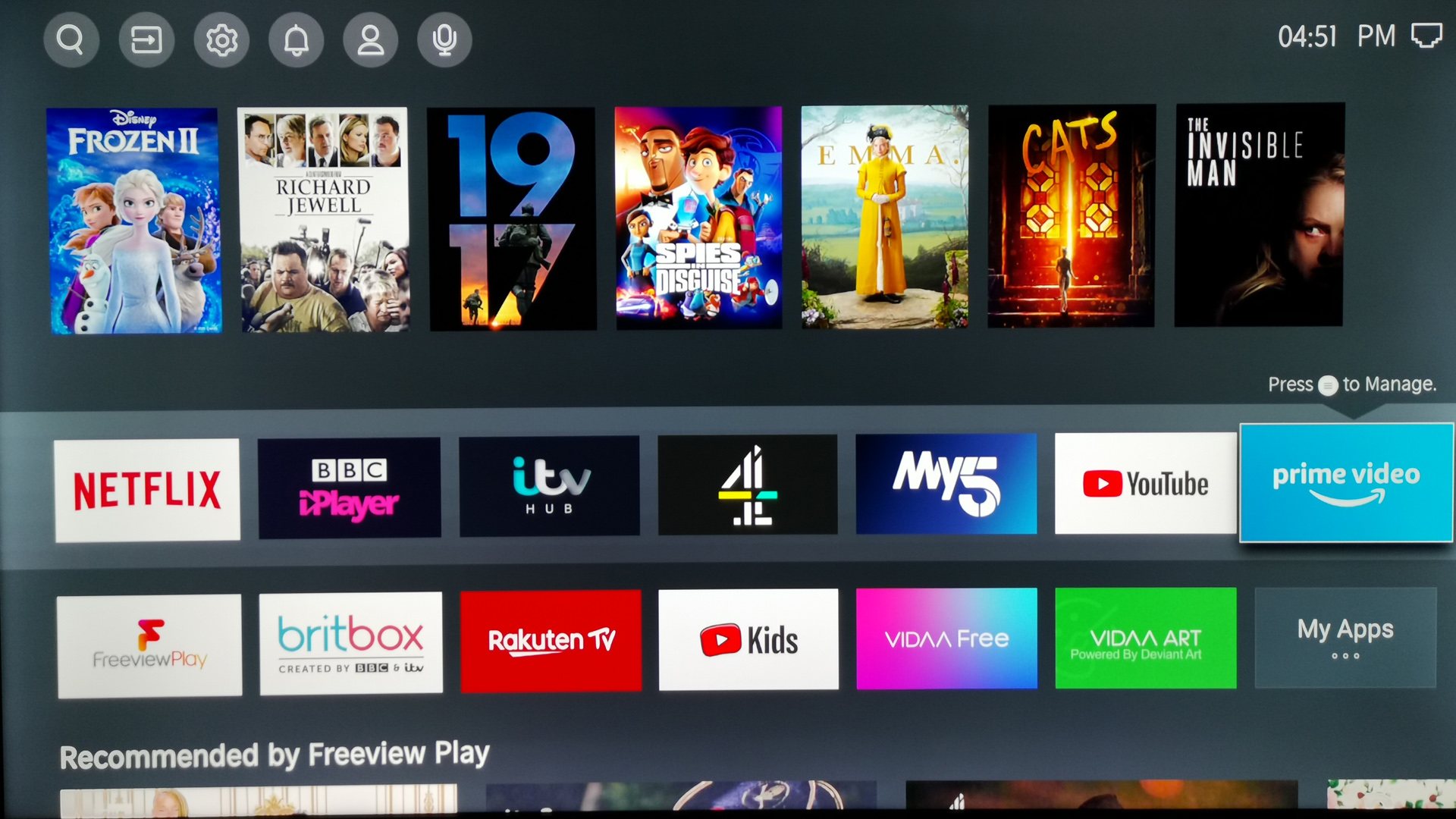Hisense A7500F (43A7500F) review: a great cheap 4K TV with Dolby Vision HDR
The Hisense A7500F offers a lot of important features for not a lot of cash, with appealing image quality, too


The Hisense A7500F is a feature-rich TV that punches above its weight (and price tag). It has its limitations, but these are outweighed by overall picture quality, gaming performance and Dolby Vision HDR.
-
+
Good average picture performance
-
+
Dolby Vision HDR
-
+
Freeview Play
-
+
Low input lag
-
-
Not the brightest HDR performer
-
-
Poor off-axis viewing
-
-
Ordinary audio
Why you can trust T3
The Hisense A7500F is positioned one rung down from Hisense’s ULED range-topping sets, but is still a well-specified TV that offers an impressive selection of features for the cash. We're testing the 43-inch Hisense 43A7500F model, which is absolutely one of the best 43-inch TVs available, and the A7500F range offers two of the best TVs under £500.
The Hisense A7500F boasts Dolby Vision HDR to make the most of 4K content on Netflix and Disney+, punchy vibrant colours, and a smart platform built for streaming. Want to watch stuff for nothing? Freeview Play ensures all main channel catch-up TV players, and free-to-view box sets, are available too.
If you’re looking for a 43-inch screen that nails that happy hunting ground between value and performance, this A7500F could well be it… and it's even one of the best gaming TVs if you're on a budget, too.
Hisense A7500F review: Price & features

The Hisense A7500F is available in 43 and 50-inch screen sizes. The 43A7500F (which we're reviewing here) typically sells for £379, while the larger model, the 50A7500F, comes in at £429. The current lowers prices are below.
There’s no direct correlation with the Hisense US TV range, although the nearest model is probably the A60GMV, which sells for $218 in its 43-inch guise. There’s also an A60 at 65-inches, priced at $448.
In Australia, once again the range isn’t a direct mirror, the nearest model would be the Series 8; the 43-inch edition is priced at AUS$899.
There are four HDMI 2.0 inputs, all capable of 4K 60Hz, along with composite AV for legacy hardware, a digital audio optical output to feed a soundbar or separate audio system, and two USB ports. The latter can be used for media playback and USB PVR time shifting.
Get all the latest news, reviews, deals and buying guides on gorgeous tech, home and active products from the T3 experts
In addition to Wi-Fi and Bluetooth, there’s an Ethernet connection for wired networking (always preferable if you have the option).
The A7500F ships with a busy remote control, spotted with dedicated service buttons: Netflix, YouTube, Prime Video, Rakuten TV, Freeview Play and YouTube Music, as well as three designated Media, Free and Art.
Art pulls up preloaded gallery images, with the ability to add more from the Deviant Art portal. Press the Free button and you’ll be directed to curated YouTube content. Media takes you directly to any connected network devices to play stored files.
Hisense A7500F review: Picture performance

The A7500F warrants at least one thumb up for its colour punch and overall clarity. Obviously, if you’re buying a 43-inch 4K TV, you'd have to be sitting pretty damn close to get the maximum benefit from the 3840x2160 pixel count, but there’s no arguing with the screen’s overall appeal.
Image modes comprise Standard, Dynamic, Game, Cinema Night and Cinema Day, and Sport. The latter can be automatically triggered if sports content is detected, but it clearly plays fast and loose with its definition of sport, deeming afternoon game shows good enough for special treatment, resulting in some over-saturated looking pictures (remember, nothing says Sport mode better than vivid pea-green grass).
For the best overall average picture brightness, we recommend Standard, as it has enough overall pop without tending toward the overly cartoony.
Alternatively, you can select Auto which engages adaptive AI, enabling the set to optimise for content. However this mode is also tied to the Alfonso Video AI system, which collects information about the TV shows and other content you’re watching, to better target advertising, which some will find creepy (though is common in smart TVs).
The A7500F has a decent selection of image interpolation modes, making it a good option for fast moving sports. MEMC (Motion Estimation Motion Smoothing) comes in Film, Clear, Standard, Smooth and Custom modes, the latter with user adjustable judder and blur reduction settings. This quite effectively reduces typical LCD motion smearing, keeping balls in play and car liveries sharp.
When watching movies, select Film as this disables overt motion smoothing.
The A7500F may be a relative cheapie, but that doesn’t mean you have to go without the niceties of life – and when it comes to HDR, that means Dolby Vision. With Dolby Vision content, of which there’s a lot on Netflix, the set will intelligently manage tone mapping for a naturalistic HDR image, even though this isn’t the brightest HDR performer in the pack.
We measured peak HDR brightness at 350 nits, using a standard 10 per cent measurement window. This isn’t enough to present searingly intense specular highlights, but it does allow for a perky, pleasing picture overall.
There are caveats, though. Because this particular Hisense lacks local dimming (if you want that, you’ll need to head up market to the ULED models), contrast is limited. This can translate to a rather flat image, particularly when watching movies with one of the Cinema presets.
The best solution is not to watch in a fully dark environment, as this just highlights the limited contrast. For the best results when watching cinematic TV shows, switching on Adaptive Contrast, as it adds a little more depth.
More seriously, the set has rather limited off-axis viewing. Sit to one side and you’ll notice colours and contrast ebbing away, For optimum viewing results, sit square to the panel.
One area the A7500F surprises is in its gaming performance. The brand cites better than 20ms input lag, which would be pretty good for casual gaming, but we measured our sample at an even more impressive 11.1ms (1080/60).
That means the A7500F could double as a large, low-cost near-field monitor for more competitive e-sports.
Hisense A7500F review: Sound quality
When it comes to audio, inevitably this Hisense doesn’t have too much to shout about.
To make the most of its limited driver provision, there’s a wide range of audio presets, including Standard, Theatre, Music, Speech, Late Night and Sports. It’s quite rowdy too, courtesy of twin 7W amplifiers.
If the set is performing second-screen duties in a bedroom or study, then you’ll find it functional enough. For anything more immersive, it makes sense to partner it with one of the best soundbars – there are plenty that are small and cheap enough to be good partners.
Hisense A7500F review: Design & usability

As you might expect, build quality of the A7500F isn’t particularly premium. But given the price, we can’t grumble. What is noteworthy is the design.
Hisense has invested in a smart unibody chassis, with no unsightly seams, and a tidy grey micro bezel. Viewed from a distance, it looks entirely presentable. The panel sits on a central stand that also has integrated cable management.
Smart connectivity comes via Hisense’s own Vidaa platform, now into its fourth generation. It’s still relatively lean when it comes to features, but most users will find it super intuitive to use, particularly with the inclusion of a new launcher View bar. It’s sprightly too, thanks to a quad-core chipset.
This comes preloaded with Netflix, Prime Video, BBC iPlayer, ITV Hub, All4, My5, YouTube, Britbox, Rakuten TV and YouTube Kids. There’s no Disney+ though, so you'd need to add it via a Roku or similar.
If you want to access catch-up TV or chill with some top tier streaming, Vidaa is more than up to the job.
There’s some nice joined-up thinking here, too. You can launch into Netflix from the Vidaa homepage. The setup is clean and easy to navigate, with rails for key streaming services and catch up players, plus content recommendations from Freeview Play.
The TV also works with Amazon Alexa and Google Assistant, offering basic voice control of power, channels and volume.
Hisense A7500F review: Verdict
There’s a lot to like about the Hisense A7500F. It combines a useful connected specification with remarkably good gaming performance.
Inevitably, there are compromises when it comes to image quality. On the plus side, its imagery is sharp and colour rich. It passes the T3 eye candy test. More discerning videophiles will be less enamoured with its limited contrast and brightness capped HDR performance – although it should be pointed out this is exactly where we’d expect a set with such budget-capped aspirations to sit.
The provision of Dolby Vision HDR helps a lot though, and when fed Dolby Vision content, the set performs well enough. You’ll need to take care with placement, though, because you’ll really notice the drop in intensity when you view off-axis.
Hisense’s own Vidaa smart platform may be stripped back, but it does the job if the job you want it to do is provide copious streaming options. Netflix users will like the way it’s fundamental to the design of the software.
For over 25 years, Steve has been casting his keen eyes and ears over the best that the world of TV and audio has to offer. He was the creator of Home Cinema Choice magazine, and contributes to huge range of technology, home and music titles along with T3, including TechRadar, Louder, Ideal Home, the i newspaper, and more.

